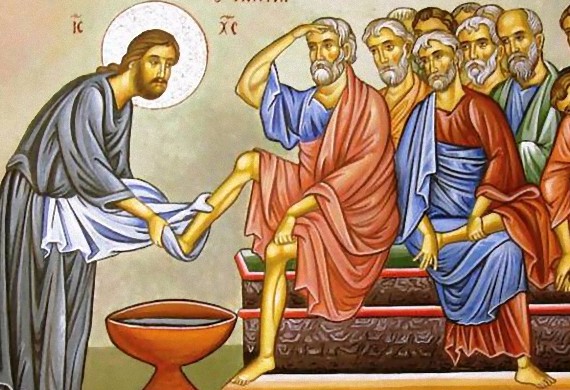On Great Wednesday afternoon Small Compline is performed and the theologically profound Canon of Saint Andrew, Archbishop of Crete the Jerusalemite, is chanted: “Furnished and ready, the upper room received You, O Creator, with Your companions at the Mystical Supper. There You have sent Your two disciples to prepare the feast for You; there You have kept the Passover, and performed the Mysteries…” It is quite clear that it refers to the Mystical Supper and to the institution of the Sacrament (Mystery) of the Divine Eucharist from the Great Chief-Priest Christ to His holy Disciples and through them to all of us.
In the evening we chant the Matins of Great Thursday. On Great Thursday “the divine Fathers who ordered all things well” have entrusted us to celebrate four things. These are:
(a) The Holy “Nipter” (Washing). During the Mystical Supper, Christ gives a superb example of humility and modesty to His disciples, washing their feet and wiping them with the “lention” (towel). Humility is the first and basic virtue which should characterise the worker of the Gospel and every Christian.
(b) The Mystical (Last) Supper, which gave “…us the dread Mysteries (Sacraments)”. At each Divine Liturgy, since the Mystical Supper, the Church repeats Christ’s holy words: “Take, eat this is my Body…” and “Drink of this all of you for this is my Blood of the New Covenant, which is shed for many, for the forgiveness of sins”.
(c) The extraordinary Prayer of our Lord in the garden of Gethsemane. Praying with agony, His absolute submission to the plan of Divine Economy for the salvation of the world, and the absolute obedience to His Heavenly Father He showed that not only was He the Pre-eternal God, but a complete human as well. And here He fooled the devil who could not understand that it is possible, that someone who prays can be God, and therefore proceeded in his plan against Jesus. At the same time He left us an example and model of prayer and obedience.
(d) The Betrayal. As one hymn from the Praises characteristically says, “Judas, the deceitful traitor, with a deceitful kiss betrayed the Lord and Saviour; he sold the Master of all as a slave to the transgressors; the Lamb of God, the Son of the Father, went as a sheep to the slaughter; for He alone is rich in mercy”. The friendship was dishonoured. The kiss was contaminated. The greeting was degraded. Love was betrayed… It is the hour of darkness!… >From then, no Christian accepted the name of Judas, even though there was another Apostle called Judas, a Saint who has nothing in common with the Iscariot. The name of Judas became synonymous with a curse.
A masterpiece of our hymnography is the Doxasticon of the Aposticha for the day which is chanted in the sweetest plagal of the 1st tone (tone 5): “Instructing Your disciples in the Mystery, O Lord, You have taught them saying: ‘My friends, take care that fear does not separate you from Me. For though I suffer, yet it is for the sake of the world. Do not be scandalised because of Me; for I have come not to be ministered to, but to minister, and to give My Life as a ransom for the world. If then you are My friends you will do as I do. He who wants to be first, let himself be the last; let the master be as the servant. Abide in Me, that you may bear fruit: for I am the vine of Life.”‘
It is customary in our Churches to perform the Holy Sacrament of Efcheleon (Unction) on Great Wednesday. Because ancient tradition has it that the Orthodox take part in the Immaculate Mysteries (Holy Communion), especially on Great Thursday, when we remember liturgically the giving of the Sacraments from the Lord to the Apostles during the Mystical (Last) Supper. It is thought that the Efcheleon comes as a last preparation of soul and body which completes the fasting, prayer and confession. Of course the main purpose of Efcheleon is largely to strengthen the health of the body. It is a divine help for the recovery and restoration of the sick.
BY METROPOLITAN JOSEPH OF PROIKONESSOS

